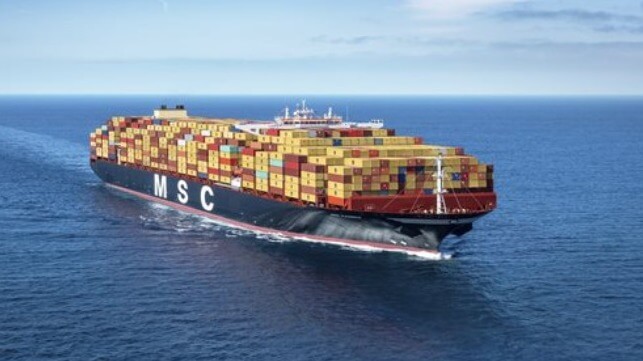MSC Reroutes Ships Passing Sri Lanka to Protect Blue Whales

The commercial shipping industry is increasingly taking action to protect endangered whale populations following revelations that some of the busiest ports and channels in the world’s oceans overlap with important habitats for whales, something that has resulted in increasing whale deaths from ship strikes.
With experts warning that the ever-expanding shipping traffic from supertankers and cargo vessels in whales’ breeding grounds and along their migration routes is resulting in an increased risk of ship strikes, the world’s largest container carrier MSC is now re-routing its vessels to protect the endangered animals.
The company announced that it has taken a step to help protect blue whales and other cetaceans living and feeding in the waters off the coast of Sri Lanka by modifying navigation guidance in line with the advice of scientists and others in the maritime sector. MSC recently began to voluntarily re-route its vessels passing by Sri Lanka on a new course that is approximately 15 nautical miles to the south of the current traffic separation scheme (TSS) for commercial shipping.
The area off Sri Lanka’s southern coast is one of the busiest shipping lanes in the world and is also inhabited by large populations of whales and other sea life putting these animals at risk of a collision with a ship. Simulations have shown that moving the shipping lane 15 nautical miles to the south could reduce the strike risk to blue whales by as much as 95 percent.
“We believe that the commercial shipping sector has an important role to play in protecting cetaceans, specifically in helping to reduce the risk of ship collisions with whales,” said Stefania Lallai, MSC Vice President for Sustainability. “MSC is proud to rank at or near the top of whale safety shipping rankings.”
She added that more shipping companies should re-route traffic to the southerly route south of the official TSS shipping lanes as a way of ensuring the shipping industry is collectively doing more to minimize the risk of ship strikes.
MSC is taking proactive action at a time when the liner shipping industry led by the World Shipping Council is advocating to create a new official marine traffic scheme that is fully separated from the blue whale feeding area in Sri Lanka. If it becomes a reality, all large-scale commercial marine traffic will be obligated to move to the more southerly zone.
Sri Lanka, which lies in the Indian Ocean between Asia and Europe, and the port of Colombo, is a major transshipment hub for global trade. Data by the Sri Lanka Port Authority show container throughput at the port of Colombo hit an all-time high of 7.2 million TEUs in 2021 with transshipment volumes accounting for 81 percent of container throughput. The 5.8 million TEUs being transshipped in the port represented 4.2 percent growth from the previous year. During the year, the port of Colombo saw 3,675 ship arrivals including 3,180 container ships.
According to MSC, westbound ship traffic will now be limited to a latitude between 05 30N and 05 35N, and eastbound traffic is limited to a latitude between 05 24N and 05 29N to avoid designated cetacean habitats. An exception has been made for vessels embarking and disembarking for safety reasons in Galle, including in case of adverse weather. Additionally, smaller feeder ships sailing around the Bay of Bengal will reduce their speed to less than 10 knots in the area.

that matters most
Get the latest maritime news delivered to your inbox daily.
A World Wide Fund for Nature (WWF) report released in February titled Protecting Blue Corridors says that a third of the world’s cetaceans are now classified by the International Union for Conservation of Nature (IUCN) as threatened, meaning they have either a high, very high, or extremely high risk of extinction. It adds that six out of the 13 great whale species are classified as endangered or vulnerable, even after decades of protection after commercial whaling.
The report shows that an estimated 300,000 cetaceans are killed annually as a result of entanglement in fishing gear and ghost nets while populations are impacted by overfishing, increasing ship traffic, underwater noise, pollution, offshore development, and climate change.
